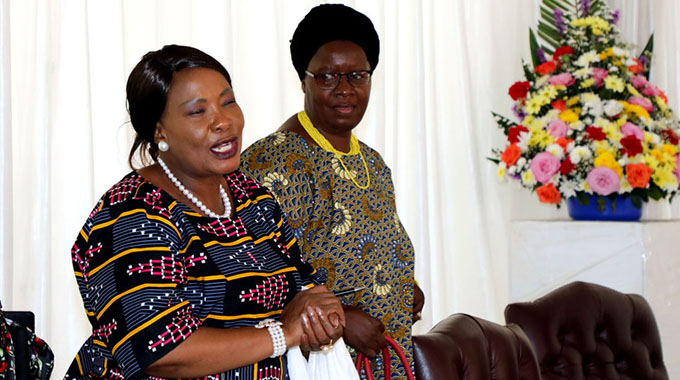The curse of child brides, school dropouts

Paidamoyo Chipunza Our Childen Our Future
Her day starts at 4:30am.
She starts it with laundry for nappies improvised from old linen, breastfeeding and a bit of household chores before she prepares herself to leave for school.
“I must wake up early because I leave home at 6:00am for me to get to school on time, which is quite a distance from our village. At the same time I cannot go to school leaving all the household chores for my grandmother with whom I live because she is old and would not manage both household chores and taking care of the baby,” said Melisa Maromo (not her real name) from Guruve in Mashonaland Central Province.
Melisa dropped out of school when she was 14 years old after being impregnated by her boyfriend.
For Melisa, her family and the community she was brought up in, marriage was the only way out after falling pregnant, even when the victim is still under the age of consent to sexual intercourse, which is 18 years according to the Zimbabwe Constitution.
Melisa recalls these words from her boyfriend: “You can’t say I am still young, I will not marry you when you are pregnant. The moment you get pregnant, your family, society and even yourself start thinking of how you are going to elope to the father of the unborn baby.”
Although she did get married, the marriage was shortlived as her “husband” was also a minor.
Melisa is one of the few fortunate young mothers who are getting an opportunity to get back to school under the Government’s second chance programme. The programme was designed for girls who drop out of school early due to unintended pregnancies and early child marriages.
However, for a majority of the affected girls, especially those who live in rural areas, rising from that pitfall remains a pipedream.
Melody Kandengwa is one such woman. Just like Melisa, Melody was impregnated at the age of 13 by her boyfriend, who was already an adult and was working for a peasant family, also in rural Guruve.
Melody, whose parents succumbed to Aids, failed to proceed to secondary education after completing her Grade Seven, due to financial problems.
Heading a family of five younger siblings with no meaningful source of income to sustain a living other than piece jobs, for Melody marriage was not only an option, but also an achievement.
“When I fell pregnant, I was happy that I was getting married. What made me happy was the fact that at least I was now going to have a man heading my family. A man who can find better means of fending for our survival,” she recalled.
She, however, said, soon after she eloped, her husband was fired by his employer who said he could not accommodate both of them at his home.
“We left for my husband’s rural home in Murehwa, where we both took up paid labour as a source of income. That has been our way of life since I got married in 2014. Now I have two children who are spaced by one year,” she said.
She said although she was still in that marriage, it has failed to change her circumstances even assisting her other siblings with basics, a reality that has also forced her two younger sisters to also elope before finishing school.
“If anything, this marriage has broken my family. I do not even know where my other siblings are since I’ve never gone back to Guruve ever since I got married. I heard my two younger sisters also got married before they completed school.
“My financial situation has not changed. I am still struggling to put food on the table or even sustain our life.
“Of late, my husband has become abusive and is no longer looking after us. Sometimes he does not even come home. I am the one who fends for the family through piece jobs,” she said.
Asked if she would go back to school if given an option, Melody said she would gladly take that offer as early marriage has even worsened her plight.
“I regret falling pregnant and I would like a chance to reset my life,” she said.
Melisa and Melody are the two girls in every six who get married before they reach the age of 18.
They also come from an area with the highest statistics on early marriages — Mashonaland Central Province — which accounts for 28,1 percent of all early marriages in the country.
Ministry of Primary and Secondary Education Principal Director Ms Kwadzanai Manungo said her ministry was worried at the number of school drop-outs, themajority of them girls.
She said according to their yearly school census, many girls do not proceed to secondary school after Grade Seven and those in areas where child marriages are rife drop out to get married.
She said while emphasis was on the girl since she is the most affected, focus must also be given to the boy child.
“While our focus is on the girl child, we should also be conscious of the fact that there are jackals and hyenas out there being empowered to disempower the girl child. We need to also empower the boy child to treat girls as equal beings,” she said.
Director for university education in the Ministry of Higher and Tertiary Education Mrs Martha Muguti said to effectively deal with early marriages, interventions must also target a shift in mindset.
She said communities must move away from viewing the girl child as a commodity, from which they make money out of her marriage.
“Girls are not born to be married. They are not born to listen to men. Parents and guardians must stop commercialising marriage,” said Mrs Muguti.
To address some of these and other challenges faced by the girl child, First Lady Amai Auxillia Mnangagwa recently announced that she will soon be launching her programme titled “First Lady and the Girl Child”.
She said the programme, which will target girls between Grade Seven and Form Six, is going to involve the girls in finding solutions to ending early child marriages.
“The girl child is more vulnerable. Not that we are to discriminate the boy child, but special attention needs to be given to the girl child as the most disadvantaged children are girls. I hereby come up with a programme ‘First Lady and the Girl Child’ where I would like to meet girls of school-going age and have an interface with them in an open environment, which allows them to open up and share their real-life experiences,” said the First Lady.
Child marriages, also known as early marriages, are defined as a “formal marriage or informal marital union before 18 years”. They are not unique to Zimbabwe, but affect many other parts of the African continent.
According to the Panos Institute of Southern Africa, the success of Zimbabwe’s efforts to curb child marriages requires collaborated efforts by different stakeholders.
“There is a need for all stakeholders in society to take measures to address the drivers of child marriages, which include social, economic, cultural and religious factors that influence norms and behaviours at the individual, community and societal levels,” said PANOS in its recent media brief on ending child marriages in Zimbabwe.









Comments